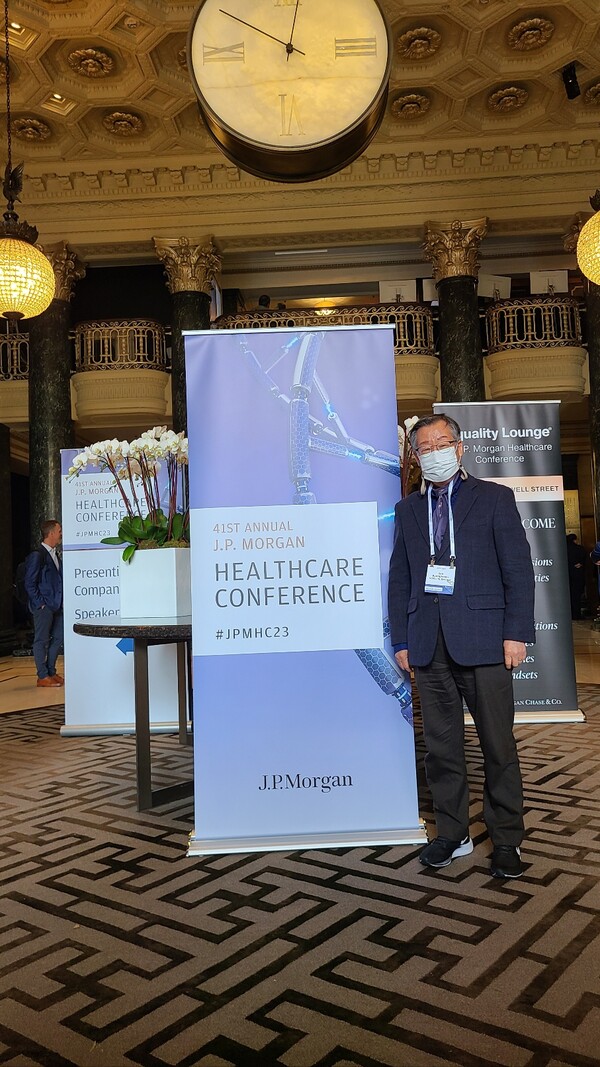SAN FRANSICO, Calif. -- By Lee Han-soo/Korea Biomedical Review correspondent – SCM Lifescience said it would develope SCM-AGH as a first-in-class treatment for acute pancreatitis, which there are currently no suitable treatment options.

Korea Biomedical Review sat down with SCM Lifescience CEO Son Byong-kwan for an interview on the sidelines of the 2023 J.P. Morgan Healthcare Conference.
He said he would push for that goal, despite its failure to achieve the primary endpoint of its phase 1/2a clinical trial of SCM-AGH to treat acute pancreatitis in September of last year.
Although it is true that the company failed to meet the primary efficacy endpoints and secure a statistical significance in improving the Modified Marshall Score (MMS) and CT severity index (CTSI), it did not mean a "clinical failure," Son added.
“Efficacy evaluation variables in the clinical stage are reflected in the design of large-scale clinical trials based on scientific evidence and analysis data collected in small-scale clinical trials,” Son said. “Therefore, it is not necessary to set the same evaluation variables set in phase 2 in phase 3 as well.”
Also, despite not meeting the primary endpoints, the company was able to confirm the safety of the treatment for patients with moderate to severe acute pancreatitis, and a statistically significant decrease in the C-reactive protein (CRP), a predictor of the severity of acute pancreatitis, quantity and in IL-6 compared to the placebo group at the initial time point (one to three days) after administration, Son added.
Son also explained that the results of phase 1/2a clinical trials for SCM-AGH in acute pancreatitis received support from the Korean gastroenterology society.
“The abstract of the SCM-AGH phase 1/2a trial was recently selected as the best abstract at the Korea Digestive Disease Week,” Son said. “The reason why the society is paying attention to this clinical result is that the therapeutic benefit of SCM-AGH has been confirmed in a situation where there is no treatment for acute pancreatitis.”
Son stressed that the company is currently developing a phase 2b clinical protocol, and the final protocol development will be completed after a prior review by the Ministry of Food and Drug Safety.
“We are aiming for clinical trial approval during the first half of this year, and we plan to conduct phase 2b clinical trials in earnest within the year,” Son said. “The company is setting the first goal for conditional product approval after securing phase 2b clinical trial efficacy results for the pipeline in Korea.”
The company had received orphan drug designation from the Ministry of Food and Drug Safety in 2020. Accordingly, if the phase 2b clinical trial is successfully completed, conditional product approval and commercialization are possible.
When asked if the company has any intention of licensing out the treatment, Son stressed that the company plans to establish various technology transfer strategies according to the results after the phase 2b clinical trial.
“We plan to carefully review global clinical trials, including the U.S., in consideration of the global situation,” Son said.
SCM Lifescience meets with 12 multinationals during 2023 JPM
Meanwhile, SCM Lifescience’s top management official stressed that it had established a base for global expansion during the 2023 J.P. Morgan Healthcare Conference.
“This is my first time coming to JPM, so I wanted to achieve three goals, which were to identify the pipelines of large pharmaceutical companies and their areas of focus investment, search for licensing-related partners, and establish an external network with renowned researchers," Son said.
Notably, Son stressed that the company met with 12 multinational pharmaceutical companies during the 2023 JPM Healthcare Conference.
“The companies that we met showed high interest in the company’s three main pipelines -- acute pancreatitis, atopic dermatitis, chronic graft-versus-host disease – and agreed to hold follow-up meetings,” Son said. “As a result of such meetings, we were able to establish more specific global strategies for technology transfer, global clinical trials, and entry into overseas markets.”
When asked why he believes that multination pharmaceutical showed interest in the company, Son explained that SCM Lifescience is a company with unrivaled source technology, and the only company that has one out of only two stem cell separation and differentiation technologies in the world.
“As the treatment is made with high-efficiency and high-purity stem cells produced based on original technology, the treatment efficacy is excellent,” Son said. “We can also carry out all cycle developing and commercializing stem cell treatments from testing, manufacturing, quality, to supply.”
Related articles
- [2023 JP Morgan Healthcare Conference] ABL Bio aims to license out 2 bispecific antibodies after Sanofi deal
- [2023 JP Morgan Healthcare Conference] Investment in healthcare will rebound in 2023: JPM
- [2023 JP Morgan Healthcare Conference] Samsung Biologics jumping into ADC, gene therapy
- [2023 JP Morgan Healthcare Conference] ‘Investors more interested in digital health’
- [2023 JP Morgan Healthcare Conference] Lotte Biologics eyes $3 bil. revenue from 3 'mega plants'
- [2023 JP Morgan Healthcare Conference] Has interest in SD Biosensor faded as Covid becomes endemic?
- [2023 JP Morgan Healthcare Conference] Orum Therapeutics, ‘the world’s 1st’ to develop a dual precision targeted protein degrader
- [2023 JP Morgan Healthcare Conference] Investors scrutinize balance sheets, expect more M&As of biopharma
- SCM Lifescience's stem cell atopic dermatitis drug shows benefit in phase 2 study

